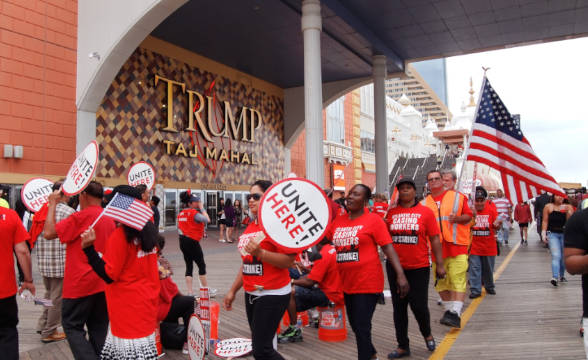Unionized casino workers know they have an ace up their sleeve and they are not afraid to play it. A refusal by Atlantic City casinos to respond to the demands of their workers may have an adverse impact on what they have called a qualified success in recovering their finances to pre-pandemic results.
Treat Workers Decently or Bear the Cost
However, the main casino worker union, Local 54 of the Unite Here, argues that should casinos hesitate, this could cost them $2.6 million per day when the strikes begin. They are set to get underway on July 1 and are looming as Damocles’ sword over the properties.
The union has run the numbers for casinos, arguing that the Borgata would possibly lose $1.6 million each day it’s paralyzed by strikes. Three casinos by Caesars Entertainment, named Harrah’s Caesars and Tropicana, stand to lose another $1 million together for each day striking actions are ongoing.
What’s the solution then? The union believes that it’s very simple – get to the negotiation table and make sure you honor worker contracts which expired several weeks ago and triggered a wave of dissatisfaction among Atlantic City’s 10,000 casino workers.
The union has used publicly available data to try and explain what may happen should casinos prove reluctant to negotiate. If the strike is allowed to happen, then casinos can expect to see their third-quarter results diminishing by as much as 25% in Q3 2021.
There will be a long-lasting impact with some out-of-state travelers coming to gamble in Atlantic City just to find out that the properties had been closed down. The contracts have not been restarted after they expired on June 1, and this is what has irked workers. Two strikes will therefore take effect if casinos are not convinced to negotiate.
After the one planned for July 1 a second one should happen on July 3, which is targeted at Hard Rock. Most of the casinos have been quiet about the upcoming development. In fact, none have offered a public statement as of last week, but this doesn’t mean that they are not moving to ensure a positive outcome of all of this.
According to Jane Bokunewicz of the Lloyd Leveson Institute at Stockton University, gauging what the financial consequences for the casinos would be are hard to gauge. For one, Bokunewicz argues that the chips also have cards to play.
For one, not all workers are unionized. This means that they may be a sufficient workforce present on casino gaming floors to keep the action going and keep various operations going. However, engaging in a war of attrition with your workforce is hardly the smartest way to inspire long-term trust and improve financial results.
Casinos Coping Ability May Decrease Strike Effectiveness
Essentially, though, how effective of a negotiating tool a strike can be would solely depend on how prepared Atlantic City’s casinos are to operate under such duress. Some casinos have preferred not to intervene. For example, Ocean Casino Resort and Bally’s have confirmed that they would follow up with any agreements and contracts that other casinos agree to.
This means that they would not be impacted by the strike, albeit this would translate into a much smaller show of force during the strike. Consumers can either direct their anger at the casinos or the workers themselves. Meanwhile, the union continues to trust public data and has argued that Caesars, which took 15% of its overall earnings in the quarter last year in Atlantic City, will be one of the most seriously impacted.
The union hopes that the beginning of the July Fourth weekend is timed well to disrupt business and give workers a stronger negotiation position. Once again, this would solely depend on whether casinos actually fall for it.


